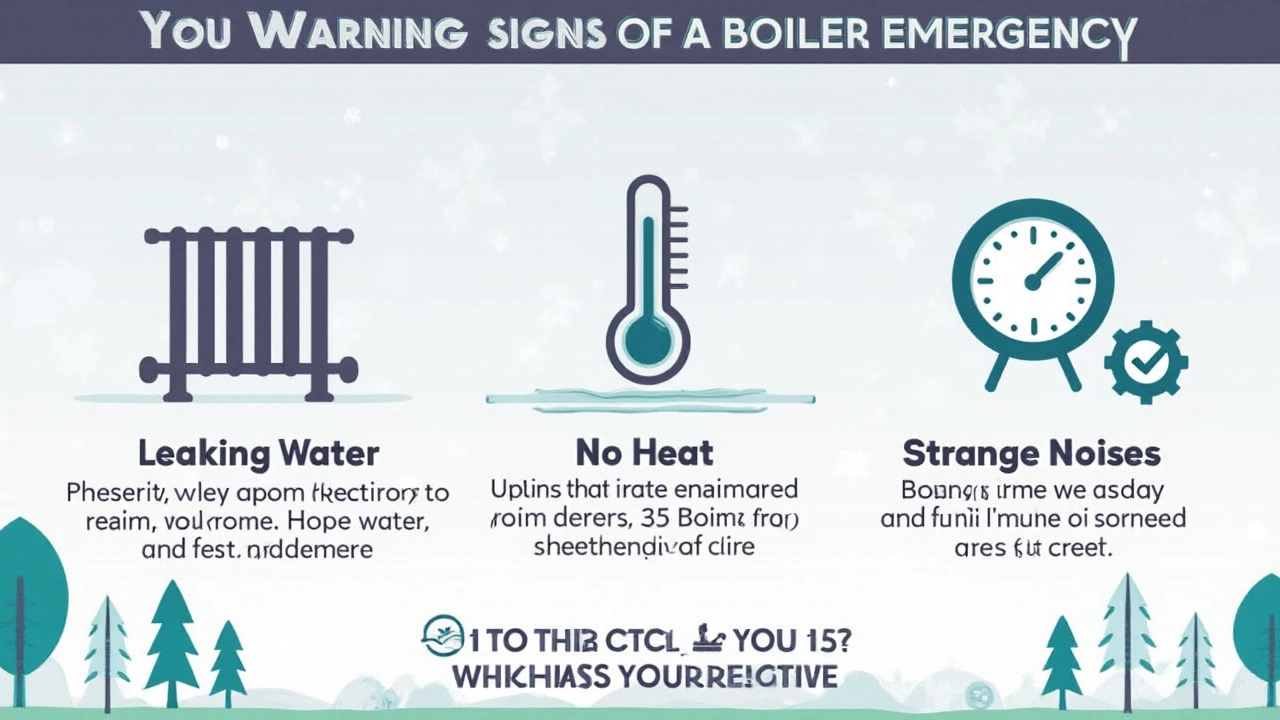When your boiler gives out, the whole house feels it—literally. No hot water for showers, radiators freezing cold, and kids complaining they can see their breath indoors. But not every broken boiler is a full-blown emergency. So how do you know if it really is one?
The quickest clue: if there’s a gas leak, strange burning smell, or loud banging noises, you can’t mess about—shut the boiler off and get help right away. If it’s just a case of no heating or lukewarm water, you’ve got more breathing room, unless it’s the middle of a cold snap or you've got kids, elderly family, or pets like my dog Charlie and cat Luna who aren’t exactly fans of shivering on the tiles.
Lot of folks try cranking the thermostat, restarting the boiler, or fiddling with radiators first. Sometimes, that's all you need. But if your boiler’s display throws out error codes, or there’s water leaking near the unit, trying to wing it could make things worse—or even dangerous. Knowing what’s normal for your boiler makes spotting the weird stuff way easier.
- What Counts as a Boiler Emergency?
- Key Warning Signs You Shouldn't Ignore
- How to Stay Safe (and Warm) Before Help Arrives
- When to Call a Professional Right Now
- Simple Tips to Prevent Boiler Breakdowns
What Counts as a Boiler Emergency?
Not every busted heater needs an ambulance run. But certain problems with your broken boiler really do count as emergencies and should get top priority. So, what puts your situation into the emergency zone?
- Gas leaks: If you ever smell gas, hear hissing near the boiler, or your carbon monoxide alarm goes off, that’s an emergency. Get everyone out, open windows if safe, and call the gas emergency number. It’s not just about comfort—it’s about your safety.
- No heating or hot water in extreme cold: If outside temperatures drop below freezing and your boiler totally stops, families with babies, elderly folks, or anyone with health issues are at serious risk. If you’re in this boat, it’s time for emergency help.
- Major leaks or flooding: Water coming from your boiler or pipes can wreck floors and electrics. That’s a double whammy—property damage and possible electrocution risk. Shut it off and call a pro right away.
- Loud banging or clunking: Odd as it sounds, loud noises from your boiler can mean big trouble, like pressure problems or failing parts. These can sometimes blow out the whole system if ignored.
- Boiler error codes that mean danger: Most modern boilers show error codes if something’s wrong. Some mean ‘service me soon,’ but others, like repeated ignition failure or overheating warnings, mean you should turn off the system right away and get help.
Here's a quick cheat sheet for emergency signs and when to act fast:
| Emergency Sign | Do This NOW |
|---|---|
| Smell gas or CO alarm | Get out, open windows, call emergency services |
| Major leaks/flooding | Shut off boiler and water, call a plumber/engineer |
| No heat/hot water, freezing weather | Prioritize if at-risk people are home |
| Loud banging/grinding | Switch off boiler, call repair tech |
Basically, if you’re ever worried that a problem with your boiler could hurt someone or destroy your stuff, treat it like a real emergency. Even if you’re just not sure, most pros would rather check it out early than deal with a disaster later.
Key Warning Signs You Shouldn't Ignore
When it comes to a broken boiler, ignoring certain warning signs isn't just risky—it can actually be dangerous. Boilers have a few ways of telling you they're in trouble, and it pays to know what those are.
- No Heat or Hot Water: Obvious, right? If turning up the thermostat does nothing and things stubbornly stay cold, your boiler repair needs should jump to the front of the queue. Sometimes, it's a small issue like a tripped fuse, but it can mean much bigger trouble.
- Strange Noises: We're talking banging, gurgling, whistling, or any sound that just doesn't sound normal. This might point to air in the system, low water pressure, or even pump failure. In older boilers, these sounds can be an early warning of something major—like a buildup of limescale or sludge that's about to block things up.
- Water Leaks: If you spot puddles or drips near the boiler, switch it off and call someone. Leaks can ruin electrical parts inside and sometimes signal high pressure or a failing component.
- Unusual Smells: A metallic, burning, or eggy smell could point to a gas leak. Carbon monoxide, which is deadly, doesn’t have a smell, but a faint burning odor or extra condensation on windows is a giveaway for something off. If your carbon monoxide detector goes off, leave the house and get help right away.
- Error Codes or Flashing Lights: Most modern boilers have a little display screen or status lights. If it’s showing a code you don’t recognize, check your manual—but don’t ignore it. Flashing lights or specific codes usually mean something inside isn’t working as it should.
Here’s a quick cheat sheet:
| Warning Sign | What It Often Means |
|---|---|
| No heat or hot water | Broken part, thermostat, or loss of pressure |
| Banging or gurgling | Air in pipes or pump problem |
| Water leaks | Faulty seal, high pressure, or corroded part |
| Unusual smells | Gas leak or burning inside boiler |
| Error codes | Depends on code—check manual or call pro |
If you notice any of these, don’t just hope it’ll sort itself out. Left alone, these boiler emergency signs can turn a small repair into a pricey disaster—or put your home at risk. Call a pro if you spot any of these issues, especially if you’ve got kids, elderly folks, or pets in the house.

How to Stay Safe (and Warm) Before Help Arrives
So your broken boiler is acting up, and you’re waiting for a pro to fix it. Safety comes first, but let’s be real—everyone in the house just wants to stop freezing. Don’t worry, there are a few things you can do to make this waiting game less awful.
- Turn off the boiler at the main switch if you smell gas, see smoke, or think something’s seriously wrong. Safety's the top priority with any boiler emergency.
- Move everyone to the warmest room. Shut the doors to keep heat in—drag your pet’s bed in along with the blankets and have everyone pile in. The living room usually wins at my place.
- Dig out extra layers. Sweaters, socks, dressing gowns—get them all on. Cheap, simple, and weirdly effective.
- Electric heaters work in a pinch, but only if you use them safely. Don’t overload outlets or leave them on when you’re sleeping or out.
- Block draughts. Roll up towels or use draught excluders against doors and windows. Even old socks stuffed under gaps can help.
If you’re using candles for light or heat, keep them clear of anything that might catch fire (curtains, bedding, Luna’s tail... trust me). Keep an eye on little ones and pets too. Also, never use outdoor grills or stoves inside.
Worried about pipes freezing while the boiler repair is on hold? Let taps drip a little to keep water moving, and open cupboards under sinks so warm air gets to the pipes. Burst pipes are a nightmare you don’t want on top of the heating drama.
| Room Type | Average Heat Loss Per Hour (No Heating) |
|---|---|
| Living Room | 2-3°C |
| Bedroom | 1-2°C |
Bottom line: while you wait, focus on safety, keep the heat from escaping, and don’t take risks. Hot drinks help more than you’d think—hot chocolate seems to keep Rowan’s spirits up, and mine too.
When to Call a Professional Right Now
There's a world of difference between a minor hiccup and a broken boiler that screams for urgent attention. Some problems can wait a day or so, but certain warning signs mean you need a pro—fast. Your safety and your family's comfort depend on it.
So, when is your boiler emergency not just annoying, but downright risky?
- Gas leaks: Smell rotten eggs or notice a hissing sound? Turn the boiler off, open windows, and get everyone out—then call the gas emergency line (in the UK, it’s 0800 111 999).
- Carbon monoxide alerts: If your carbon monoxide (CO) alarm goes off or you feel dizzy, nauseous, or get a headache whenever the boiler’s running, shut it down and call for help. CO poisoning can be deadly and has no smell or taste.
- Water leaks: Water pooling around the base, especially if it’s hot or spraying? This could cause electrical faults or even structural damage. Switch off the boiler and mains water supply—don’t risk DIY repairs here.
- Strange noises: Banging, whistling, or clanging (that’s not from a dropped toy or the cat knocking something) can signal high pressure, air trapped inside, or failing components. Left alone, they get worse—and more dangerous.
- No heating or hot water in freezing weather: With kids or older folks at home, a cold house is an emergency when outside temps are near or below freezing. Hypothermia creeps up on you, and pets can suffer too.
Here’s a quick guide on when to pick up the phone:
| Situation | Immediate Action | Call a Professional? |
|---|---|---|
| Gas leak | Turn off gas, evacuate, call gas emergency line | YES |
| CO alarm triggered | Turn off boiler, evacuate, call emergency | YES |
| Major water leak | Turn off boiler & water supply, mop up | YES |
| No heating (freezing outside) | Bundle up, use space heaters safely | YES |
| Error code/flashing lights | Check manual, reset if safe | Maybe, if unresolved |
If you see error codes flashing, check the manual to see if it’s a known glitch you can safely reset. But if the code points at pressure, flame failure, or sensor faults—don’t push your luck. Anything involving gas, power, or water pouring out is a job for a certified engineer. A quick fix now can save you a sky-high repair bill later, not to mention keeping everyone safe.

Simple Tips to Prevent Boiler Breakdowns
It’s way easier and cheaper to prevent a broken boiler than to call up a professional when your house feels like the Arctic. Most boiler issues pop up because folks skip out on basic care or ignore little warning signs. Here’s what really works when it comes to keeping your boiler repair costs down and the heat on all season.
- Get your boiler serviced once a year. Think of it like a health check for your heating. A trained engineer can spot parts about to fail before your boiler gives up. Most breakdowns happen to boilers that haven’t seen a pro in ages. Some home insurance policies even need yearly servicing to stay valid.
- Bleed your radiators. If your radiators have cold patches or weird gurgling noises, they probably have air trapped in them—it puts extra stress on your boiler. Just take a bleed key, twist the valve, and let the air out until water starts to trickle. Do this at least once before winter.
- Keep the pressure steady. Most boilers work best around 1.0–1.5 bar. Too low or high and your heating loses its punch, or worse, the boiler won’t even fire up. You can check the gauge on the front. If you’ve been topping it up a lot, call a pro—it could mean there’s a leak.
- Look for leaks or rust. A little puddle or odd brown stains near your boiler spells trouble. Water and electrics are a bad mix. Catching a leak early can save your boiler—and your wallet.
- Don’t ignore error codes or warning lights. It’s tempting to just reset the boiler and carry on, but some error codes mean big trouble ahead. Keep your user manual handy or look up the code on the manufacturer’s website. If it won’t clear, call for help.
Just how bad can missed maintenance get? Check out this quick look at what happens if you skip some of these steps:
| Missed Step | Common Result | Estimated Cost to Fix (£) |
|---|---|---|
| No annual servicing | Major breakdown, new boiler parts | 160 - 550 |
| Never bleeding radiators | Boiler strain, higher bills | None if caught early |
| Ignoring pressure issues | Pump damage, leaks | 100 - 400 |
Last tip—don’t pile junk or boxes around your boiler. They need space and air for safe running. My cat Luna once squeezed behind ours and knocked a vent cover off; good thing it was an easy fix, but not everyone’s so lucky.
Simple, quick checks save you from icy surprises and those panicked phone calls when winter bites back.


